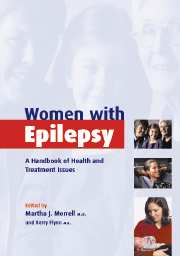Book contents
- Frontmatter
- Contents
- List of contributors
- Part I The woman with epilepsy
- Part II Epilepsy diagnosis and treatment
- Part III Hormones and the brain
- Part IV Health challenges for women with epilepsy
- Part V Family planning, pregnancy, and parenting
- 18 Family planning and contraceptive choice
- 19 Pregnancy risks for the woman with epilepsy
- 20 Risks of birth defects in children born to mothers with epilepsy
- 21 Neurocognitive outcome in children of mothers with epilepsy
- 22 Parenting for women with epilepsy
- Part VI Living well with epilepsy
- Appendix: The Epilepsy Foundation's Campaign for Women's Health: bringing help and hope to women with epilepsy
- Index
- References
20 - Risks of birth defects in children born to mothers with epilepsy
from Part V - Family planning, pregnancy, and parenting
Published online by Cambridge University Press: 02 November 2009
- Frontmatter
- Contents
- List of contributors
- Part I The woman with epilepsy
- Part II Epilepsy diagnosis and treatment
- Part III Hormones and the brain
- Part IV Health challenges for women with epilepsy
- Part V Family planning, pregnancy, and parenting
- 18 Family planning and contraceptive choice
- 19 Pregnancy risks for the woman with epilepsy
- 20 Risks of birth defects in children born to mothers with epilepsy
- 21 Neurocognitive outcome in children of mothers with epilepsy
- 22 Parenting for women with epilepsy
- Part VI Living well with epilepsy
- Appendix: The Epilepsy Foundation's Campaign for Women's Health: bringing help and hope to women with epilepsy
- Index
- References
Summary
Dr Aline Derdiarian is a practicing neurologist and epilepsy specialist. She lectures widely on this topic. She is currently in private practice in California. This chapter also includes further information on gynecological and obstetrical care of women with epilepsy. This information should provide a good basis for discussion between the woman with epilepsy, her neurologist and obstetrician/gynecologist.
MJMIntroduction
Every pregnant woman wants to be certain that her baby is born healthy. Although women with epilepsy have a somewhat higher risk of having a child with a birth defect than do women without epilepsy, many overestimate the risk, partly because of the many misconceptions about epilepsy and pregnancy, even today. With the help of her physician or nurse, each woman with epilepsy can make a realistic assessment about the risks of pregnancy given her particular situation. It is important to remember that, with good preconception and prenatal care, more than 90% of women with epilepsy will have a normal, healthy infant.
Causes and mechanisms of birth defects/adverse outcomes
Birth defects include major congenital malformations and minor anomalies. Major malformations are significant physical defects which may be life threatening and generally require surgical treatment. Four to eight percent of children born to mothers with epilepsy have a major malformation, as compared to 2–4% of children born to mothers without epilepsy. Minor abnormalities are defined as variations from normal appearance that have no effect on health or well-being.
Keywords
- Type
- Chapter
- Information
- Women with EpilepsyA Handbook of Health and Treatment Issues, pp. 215 - 221Publisher: Cambridge University PressPrint publication year: 2003

